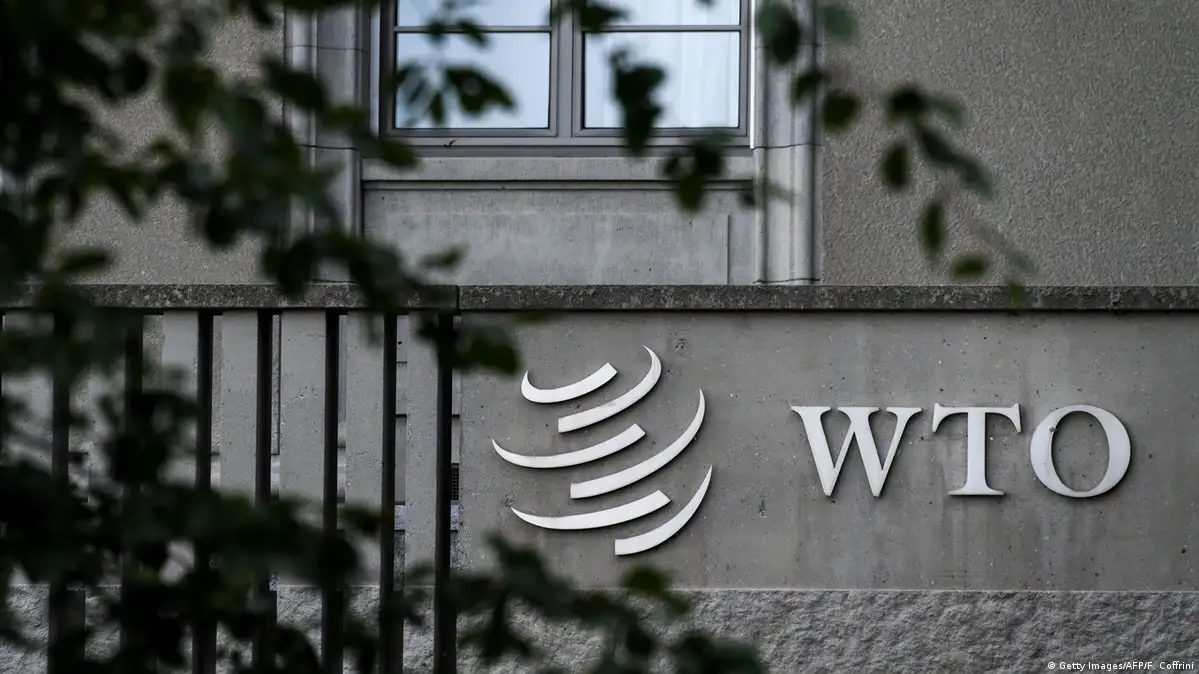How to restore WTO’s authority (Indian Express)

- 05 Feb 2024
Why is it in the News
Since the end of 2019, WTO’s crown jewel, the appellate body (AB) stands crippled because the US has single-handedly blocked the appointment of new members.
Context:
- The 13th ministerial meeting of the World Trade Organization (WTO) is scheduled in Abu Dhabi, presenting a chance to tackle the persistent crisis in the Dispute Settlement Mechanism (DSM).
- The effectiveness of WTO's key component, the DSM, has diminished since late 2019, mainly due to the United States obstructing the appointment of new Appellate Body (AB) members.
- Despite the implications of this crisis, there exist specific options for developing countries that could offer potential solutions to rejuvenate the DSM.
What is the World Trade Organization (WTO)?
- The WTO is an international institution responsible for overseeing global trade rules among nations.
- With 164 member countries (including Liberia and Afghanistan, the most recent additions in 2016) and 25 observer countries and governments, it officially commenced operations on January 1, 1995, replacing the 1948 General Agreement on Tariffs and Trade (GATT) in accordance with the 1994 Marrakesh Agreement.
Organizational Structure:
- The highest authority within the WTO is the Ministerial Conference, comprising all member states, typically meeting biennially with a consensus-driven decision-making approach.
- Daily operations are managed by three bodies, sharing the same membership:
- General Council:
- Functions as the primary decision-making body.
- Convenes as the Dispute Settlement Body (DSB) when addressing disputes between WTO members.
- Dispute Settlement Body (DSB):
- Empowered to establish dispute settlement panels.
- Refers matters to arbitration.
- Adopts reports from panels, Appellate Body, and arbitration.
- Monitors the implementation of recommendations and rulings, authorizing concession suspension in cases of non-compliance.
- Exclusive authority to make decisions, while panels and the Appellate Body can only offer recommendations.
- Trade Policy Review Body:
- Operates with terms of reference distinct from the General Council and DSB.
- Assesses the trade policies of member countries through periodic reviews.
- This structure ensures effective governance and dispute resolution within the WTO framework, emphasizing consensus in decision-making processes.
The Importance of the Appellate Body (AB):
- Enforceable Decision-Making:nThe Appellate Body (AB) holds the authority to review and, if necessary, overturn legal findings and interpretations by WTO panels.
- This enforceable nature ensures a conclusive resolution to trade disputes, fostering stability and predictability in international trade relations.
- Mandatory Jurisdiction: The AB's jurisdiction spans all WTO member countries, creating a mandatory framework for resolving disputes.
- Member nations are obligated to participate in the AB process, reinforcing the foundation of a rules-based international trading system.
- Advocacy for Equitable Practices: By addressing disputes and upholding compliance with WTO rules, the AB contributes to the promotion of fair and equitable trade practices.
- This approach establishes a level playing field for both developed and developing nations, supporting inclusivity and sustainable economic growth.
Challenges in the Dispute Settlement Mechanism (DSM):
- Appellate Body's Paralysis: Since late 2019, the AB, integral to the DSM, has been practically non-functional due to the blockage of new member appointments, primarily led by the United States dissatisfied with previous dispute outcomes.
- This obstruction erodes the binding nature of the dispute resolution process, creating a legal void.
- Evasion of Compliance: With the AB inoperable, countries have found a loophole to evade compliance with WTO panel rulings.
- Nations can appeal into the void, rendering the DSM ineffective and contradicting its purpose of providing a binding and enforceable resolution to trade disputes.
- Prolonged Dispute Resolution: The absence of a functioning AB leads to delays in resolving trade disputes.
- Without a binding appellate process, disputes may linger, contributing to economic uncertainties and potential retaliatory actions among trading partners.
- Undermining Rules-Based Trade: The DSM crisis jeopardizes the concept of a rules-based international trading system.
- The inability to enforce agreed-upon rules diminishes predictability and stability crucial for global economic growth through trade.
Potential Measures for Developing Countries to Sustain a Functional Two-Tiered DSM:
- Participation in the European Union-led MPIA: Developing countries can explore joining the European Union-led multi-party Interim Appeal Arbitration Arrangement (MPIA) as an initial option.
- This arrangement formalizes the arbitration mechanism already available under the WTO, providing appellate review for panel reports.
- However, the MPIA's voluntary nature poses challenges, leading to ad hoc tribunals and limited adoption of awards by all WTO members.
- Creation of a Restricted AB with Limited Powers: Considering the opposition to the AB by the United States, an alternative is formulating a diluted AB with constrained powers.
- Limiting the AB's authority in various ways, such as deference to parties in dispute and non-persuasive value of rulings, may be explored.
- However, a diluted AB could contradict the intended role of the DSM in providing security and predictability to the multilateral trading regime.
- Resurrecting the AB with an Opt-Out Provision: Scholars Robert Howse and Wenhua Ji propose resurrecting the AB with a critical modification—allowing countries to opt out of compulsory AB jurisdiction.
- Countries opting out would be excluded from participating in the appellate process, settling disputes solely through a single-tier panel jurisdiction.
- Critics express reservations about altering the intrinsic nature of a two-tier binding DSM but acknowledge the need to safeguard the AB's integrity.
Conclusion
In addressing the WTO DSM crisis, developing countries, including India, confront a complex decision-making process.
While restoring the AB to its original form is ideal, the suggested resurrection with an opt-out provision offers a pragmatic compromise, recognizing challenges while preserving the AB's legitimacy.
As WTO member countries gather in Abu Dhabi, the way forward requires thoughtful consideration of trade-offs to balance DSM effectiveness with accommodating diverse interests in the global trade landscape.
